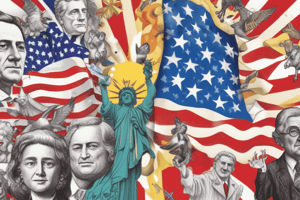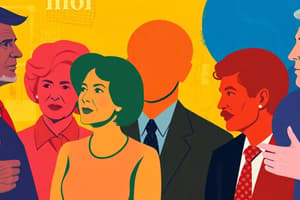Podcast
Questions and Answers
What is one of the main functions of political parties?
What is one of the main functions of political parties?
What defines a two-party system?
What defines a two-party system?
Which type of minor party focuses on a single issue?
Which type of minor party focuses on a single issue?
Why are third parties often considered important in elections?
Why are third parties often considered important in elections?
Signup and view all the answers
What is a bonding agent in the context of political parties?
What is a bonding agent in the context of political parties?
Signup and view all the answers
Which of the following is an example of an ideological party?
Which of the following is an example of an ideological party?
Signup and view all the answers
What is a common reason third parties struggle to succeed?
What is a common reason third parties struggle to succeed?
Signup and view all the answers
How do interest groups primarily seek to influence legislation?
How do interest groups primarily seek to influence legislation?
Signup and view all the answers
How do interest groups primarily differ from political parties?
How do interest groups primarily differ from political parties?
Signup and view all the answers
What is the main function of a political action committee (PAC)?
What is the main function of a political action committee (PAC)?
Signup and view all the answers
What is the maximum amount a PAC can contribute to a candidate committee per election?
What is the maximum amount a PAC can contribute to a candidate committee per election?
Signup and view all the answers
What distinguishes super PACs from traditional PACs?
What distinguishes super PACs from traditional PACs?
Signup and view all the answers
What significant decision was made in the Citizens United vs. FEC case?
What significant decision was made in the Citizens United vs. FEC case?
Signup and view all the answers
Which of the following entities are super PACs prohibited from donating directly to?
Which of the following entities are super PACs prohibited from donating directly to?
Signup and view all the answers
Which statement is true about the money trails of PACs?
Which statement is true about the money trails of PACs?
Signup and view all the answers
Which of the following best describes the contributions that can be made by Super PACs?
Which of the following best describes the contributions that can be made by Super PACs?
Signup and view all the answers
Signup and view all the answers
Study Notes
Political Parties and Interest Groups
- A political party is a group of individuals who aim to control the government by winning elections and holding public office.
- Another definition of a political party is a group of people united by shared principles, seeking to influence public policies and programs.
- Political parties have five major functions:
- Nominating candidates
- Informing and activating supporters
- Bonding agent: working together to accomplish their goals
- Governing: representing the people and supporting their party
- Watch dog: the party out of power criticizes the party in power.
- A two-party system is when two major parties dominate a government's politics.
- The first two parties in the US were the Federalists and Anti-Federalists.
- Framers thought political parties would cause conflict.
- Minor parties have four main types:
- Ideological parties (based on beliefs, e.g., Socialist Party)
- Single-issue parties (focus on one issue, e.g., Right to Life Party)
- Economic protest parties (emerge during economic hardship, e.g., Populist Party)
- Splinter parties (break away from major parties, e.g., Green Party)
- Third parties are often important as critics and innovators for major political parties. They also highlight issues not covered by major parties
- Interest groups consist of people united for political objectives. They often seek to influence legislation through lobbying.
- Interest groups are different from political parties in three key aspects:
- Nomination processes (interest groups don't nominate candidates)
- Primary focus (interest groups focus on policy; parties on government)
- Scope of interest (interest groups typically focus on limited issues)
- Political Action Committees (PACs) are tax-exempt organizations pooling campaign contributions to elect/defeat candidates.
- Most PACs represent business, labor, or ideological interests.
- PACs can give specific amounts of money to candidates and committees.
- Super PACs are independent expenditure-only committees. They can raise unlimited sums of money from various donors.
- Super PACs can spend unlimited amounts on electioneering activities, but cannot coordinate with candidate campaigns.
- Super PACs emerged after the Citizens United v. FEC Supreme Court decision.
- The Citizens United v. FEC case allowed corporations and other outside groups to spend unlimited amounts of money during elections.
Studying That Suits You
Use AI to generate personalized quizzes and flashcards to suit your learning preferences.
Related Documents
Description
This quiz covers the definition and functions of political parties, including the dynamics of a two-party system and the roles of minor parties. It delves into how parties influence public policy and governance, and highlights historical contexts of political groupings in the U.S. Explore the impact of various types of parties on the political landscape.




